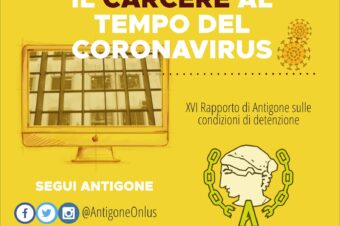November 2018 – Spain
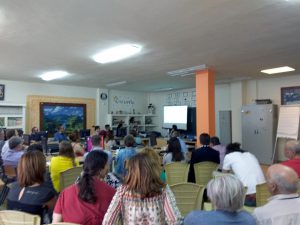 The Further Learning School (CEPER in Spanish) Retamar is located inside the El Acebuche Penitentiary Center, in Almería (Andalusia, Spain). At the beginning of 2012, an Italian school with interest in requesting an adult learning association to share experiences and improve lifelong education in European prisons, contacted us.
The Further Learning School (CEPER in Spanish) Retamar is located inside the El Acebuche Penitentiary Center, in Almería (Andalusia, Spain). At the beginning of 2012, an Italian school with interest in requesting an adult learning association to share experiences and improve lifelong education in European prisons, contacted us.
Until that moment, the CEPER Retamar had not considered participating in any European project, mainly because we didn’t have any experience on that and especially because we thought that we didn’t meet the requirements, since our students could not do mobilities. We develop our work in a closed institution and sometimes we find it hard to believe that we are allowed to follow the standard paths that any educational institution actually does.
After an intense and productive debate in the School bodies, we requested participation, but we did not succeed in the first attempt. It was again requested in 2013 and the Project “ON / OFF Exchange of methodologies in education of detainees” ( Grundtvig Lifelong Learning Association) was admitted, and it was formed by institutions from Sicily, Sardinia, France, Portugal and Spain (CEPER Retamar).
What this first European project meant to us was:
– A very enriching experience.
– Learning about other working experiences.
– Giving value to the educational activities we carry on, which have been positively considered and even followed by the other members of the Lifelong Learning Association, such as: actions to obtain necessary competences for social and labor reintegration (Entrepreneurial Culture plans: Creating Business, Access to Training Cycles, also collaboration with the Penitentiary Center in the Occupational Training Courses of the European Social Fund, ..)
– Student-teacher interaction (programme “A Proposal for Peace and Tolerance in Closed Settings”, within the program School, a place for peace).
– Students’ participation in the school governing bodies, participation in the Board of Delegates, Coexistence Commission, Economic Commission and School Council.
– Coordination and collaboration with the Penitentiary Center, with the participation in the treatment teams, technical teams of the modules: respect, educational, and therapeutic modules, team for Coordination of activities of the Penitentiary Center…
During the last meetings of this project, the French partner suggested to work on a new Erasmus + project to foster the feeling of European citizenship through civic and social values, and CITI-VAL (CITIzenship VALues or Citizenship Values) was born. However, the submission wasn’t admitted this first time.
It was again requested in the 2015/2016 school year and, still waiting for admission, the possibility of a new project 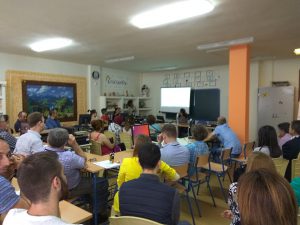 arose, in this case a KA-3 (Support for policy reform. Social inclusion through education , training and youth). This new project, which we called SERA (SEcularism and Radicalization), was born out of the need to respond to the sad recent events that had occurred in different parts of Europe (terrorist attacks in France – Charlie Hebdo, Sala Bataclán -, Belgium, United Kingdom). SERA and CITI-VAL complemented each other perfectly, since the learning and strengthening of civic, social and moral values (CITI-VAL), could, at the same time, contribute to preventing and fighting radicalization phenomena in closed spaces, also through the learning and consolidation of the values that underlie secularism (SERA).
arose, in this case a KA-3 (Support for policy reform. Social inclusion through education , training and youth). This new project, which we called SERA (SEcularism and Radicalization), was born out of the need to respond to the sad recent events that had occurred in different parts of Europe (terrorist attacks in France – Charlie Hebdo, Sala Bataclán -, Belgium, United Kingdom). SERA and CITI-VAL complemented each other perfectly, since the learning and strengthening of civic, social and moral values (CITI-VAL), could, at the same time, contribute to preventing and fighting radicalization phenomena in closed spaces, also through the learning and consolidation of the values that underlie secularism (SERA).
Both projects were admitted and thus our busy yet fruitful adventure with European projects began. CITI-VAL had its end last August 2018, but SERA will continue until next May 2019.
The whole school is involved in the projects, both teachers and students, since the preparation of material requires not only the experience of teachers and other professionals in the field of education, but also the valuable information that our students can provide in this regard.
Below is a brief description of what the work done in the two projects consisted of.
The following institutions make up the CITI-VAL consortium:
– Euro-Compétences et Initiatives pour le Développement de l’Entrepreneuriat Solidaire Euro-CIDES (coordinating organism). (Le Tuzan, France).
– Ministerium der Justiz Rheiland-Pfalz (Mainz, Germany).
– CEPER Retamar (Almería, Spain).
– FORESEE / National University of Public Service Faculty of Law Enforcement (Budapest, Hungary).
– Ankara İl Milli Eğitim Müdürlüğü (Ankara, Turkey).
The ultimate goal of this association was to create a pedagogical package with educational material of 62 hours.
As an assignment prior to the creation of the material, an analysis of existing educational experiences that could inspire us for our work was made. Then, we decided to agree on the values that we wanted our students to work on, and deal with them through different topics.
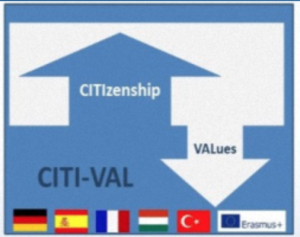 We select 7 values - respect, freedom, peace, solidarity, sense of duty, critical thinking, allegiance to the constitution – and around 20 subjects – democracy, European institutions, citizenship, people with disabilities, media, equality, moral dilemmas, conflicts management, ethnicity and diversity … among others. With this as a starting point, we began to work on the design of a template for a teaching unit that would serve as a guide for the implementation and that would include essential points such as objectives, classroom organization, activities, key competences to be developed, materials, etc.
We select 7 values - respect, freedom, peace, solidarity, sense of duty, critical thinking, allegiance to the constitution – and around 20 subjects – democracy, European institutions, citizenship, people with disabilities, media, equality, moral dilemmas, conflicts management, ethnicity and diversity … among others. With this as a starting point, we began to work on the design of a template for a teaching unit that would serve as a guide for the implementation and that would include essential points such as objectives, classroom organization, activities, key competences to be developed, materials, etc.
We distributed this work of creation among all the partners and, even, one of our students contributed in a special and more than positive way in the design of a unit. A total of 32 pedagogical units were designed and further tested by students from the prisons of each country (each country implemented 6 or 7 units designed by other partners). With the corresponding instruments and methods, the results obtained from the implementation of each unit were evaluated, which served to substantially improve and readjust different aspects of the units. Finally, the digital layout work of the resulting pedagogical package was carried out. We are happy to share this material with anyone who wishes so, and it can be found in English and in each of the mother tongues of the participating countries here.
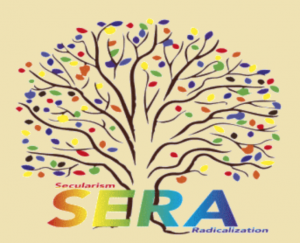 In SERA, we work with different professionals in the educational and judicial field of:
In SERA, we work with different professionals in the educational and judicial field of:
– University Colleges Leuven Limburg – Groep Welzijn (Diepenbeek, Belgium).
– CEPER Retamar – Ministry of Education of the Junta de Andalucía (Almería, Spain).
– Euro-Compétences et Initiatives pour le Développement de l’Entrepreneuriat Solidaire Euro-CIDES (coordinating organism) (Le Tuzan, France).
– Dipartiment tal-Kriminoloġija / L-Università ta ‘Malta (Msida, Malta).
– Ankara İl Milli Eğitim Müdürlüğü (Ankara, Turkey).
The main aim of this association is the creation of an intensive course of 4 weeks (6 hours a day during 5 days), with a total of 120 hours. This design is repeated for 2 more months, with different activities, thus reaching a total of 360 hours.
The starting point for the course design were Maslow and Pinto’s theories of motivation that control the human behavior, which, combined, comprise both an individualistic approach (satisfaction of physiological and safety needs, according to Maslow) and also a collective or group perspective (need to please, put oneself in the place of the other, according to Pinto).
With these premises, a series of common threads or guiding principles (primary needs, physical well-being, cooperation / teamwork, reflection, values and educational activities) are considered, which, through specific areas (psychology, interculturality, education, social, beliefs) and from the personal, individual and collective dimensions, guide the work to be done in the classrooms with the inmates / students. Currently, the design of activities has been completed and the resulting pedagogical units are being tested in different institutions of each member country of the consortium.
For the time being, the pedagogical material can be consulted in its English version on the project platform, which will be soon updated with the versions in the other languages. Likewise, it may soon be available on the ERASMUS +, E-Twinning, EPALE platforms and on the corresponding websites of the institutions and participating organizations.
In conclusion, and as an encouraging message to continue working on the improvement of social inclusion and reintegration through good practices, we would like to highlight the positive aspects that all this work has meant for us:
– High degree of motivation.
– Higher educational quality.
– Achievement of educational challenges.
– Learning about different educational dynamics immersed in other cultures that we can adapt to our environment.
– Reinforcement of our daily performance in the classroom, to prove that the way we work, the organization, the participation of the students in the school or the actions and methods that we followed have been innovative and attractive for the rest of the countries that have visited us.
– Highly enriching experience through the creation of new educational materials in collaboration with other schools with different educational and legislative systems.
And, above all, the overall improvement of our school, with other new teaching proposals that are included into our students’ teaching design and that give a necessary response to some growing problems that currently need to be addressed at an institutional level from a psycho- social, educational and emotional perspective, as is the phenomenon of extremism and violent radicalism.
by Valeria Gisbert Gallego (Teacher) and Juan Carlos Martínez Rodríguez (Head Teacher at CEPER Retamar)

![Interview – We talked to DOÑA MARÍA, our teacher [EN/ES]](https://www.epea.org/wp-content/uploads/donamaria-340x226.png)

![SCHOOL AND SOCIETY GOING TOWARDS THE DIGITAL TRANSITION [EN|PT|GE|IT]](https://www.epea.org/wp-content/uploads/digtalpt-340x226.jpg)
